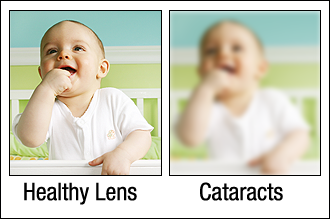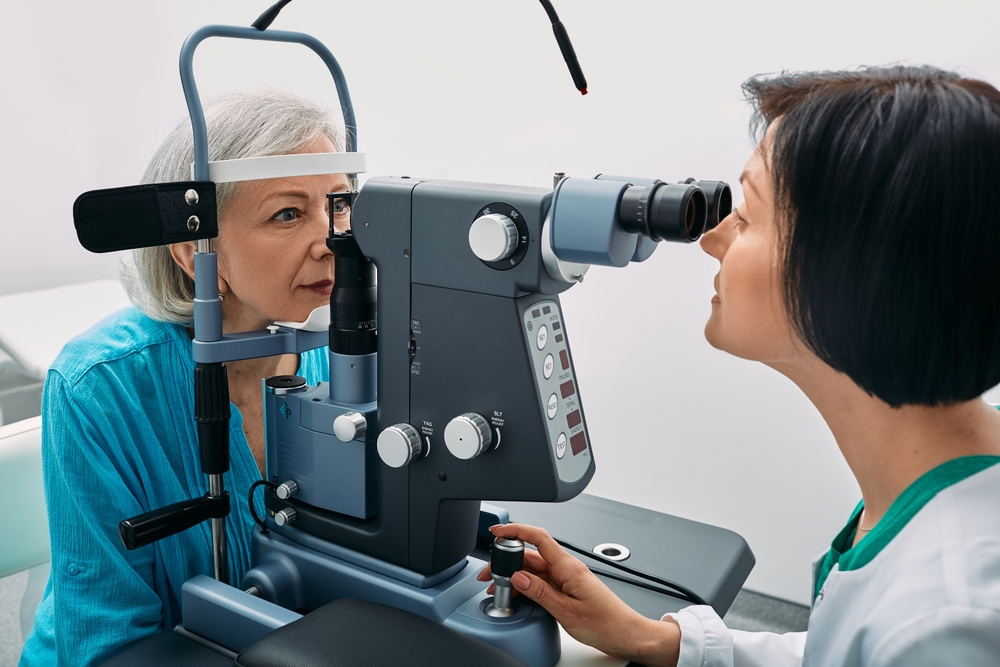Home » Blog » Is Your Foggy Vision Due to Cataracts?
Is Your Foggy Vision Due to Cataracts?
Posted by: Georgia Eye Partners in Cataract

With age, everything changes. Your vision is included in that. The chemicals in your body change, making your eyes more vulnerable to certain conditions.
It’s common to have foggy vision as you age, even if you think you aren’t that old. Being over 40 increases your risk of developing several age-related eye conditions, many of which can cause blurry vision.
Cataracts are one of the most common eye conditions. It’s common for many people to start developing them in their forties.
Foggy vision is one of the main symptoms of cataracts. If your vision is cloudy or foggy, it could be because you have cataracts.
But foggy vision isn’t a vision problem exclusive to cataracts, meaning you could be experiencing a different problem with your vision. Many people in their forties also have presbyopia, which can cause blurry vision.
Several other eye conditions can cause blurry vision. To better understand what’s causing the visual symptoms you’re experiencing, you need to be aware of these potential conditions and how they can affect your vision.
Cataracts frequently cause foggy vision. Keep reading to learn more about cataracts, what they are, how they affect your vision, and if your foggy vision could be due to cataracts!
What are Cataracts?

Cataracts are proteins that build up and clump together on the eye’s natural lens. Before cataracts, the lens is usually clear, but it becomes cloudy if you have a cataract.
Although the exact cause of cataracts is still unclear, what’s known is that they are associated with aging. As you get older, your risk of developing cataracts increases.
It’s common to develop cataracts when you’re in your forties. However, it can take many years for them to develop fully.
Cataracts in their early stages may not cause any symptoms at all. That means many patients with early cataracts may not even realize they have them initially.
However, the longer you have cataracts, the cloudier your natural lens will likely become. As a result, it gives the cataract time to develop and mature, affecting your vision and ability to see.
What are the Symptoms of Cataracts?
When you have cataracts, blurry, foggy vision is the primary symptom. If you think of your lens as a pane of glass and a cataract as fog on the glass, it becomes apparent why your vision becomes foggy.
Seeing through your natural lenses is more challenging when they’ve become cloudy because of cataracts. The murkier they become, the more blurry your vision becomes.
Refractive errors that require glasses or contacts to correct them also cause blurry vision. But you can still see clearly with these visual aids when you wear them to correct refractive errors like nearsightedness, farsightedness, and astigmatism.
However, cataract patients can’t correct their vision using visual aids because they cannot see through their cloudy natural lenses due to cataracts. One sign that your blurry vision could be due to cataracts is that using a stronger prescription for your glasses or contact lenses is no longer effective at helping you see better.
Instead, you may find that you need stronger prescriptions far more frequently because your vision continues to worsen. Other cataract symptoms include:
- Double vision in one eye
- Glare
- Halos
- Light sensitivity
- Poor night vision
- Difficulty seeing color contrast
- Finding it more challenging to drive at night
If you have blurry vision and have experienced some of these other symptoms, it may be a sign that you could have cataracts. However, symptoms like blurry vision are not exclusive to cataracts.
Other eye conditions also have similar symptoms, so seeing your eye doctor is the only way to know if you have cataracts. Schedule eye exams regularly by the time you turn 40 so your ophthalmologist at Georgia Eye Partners can diagnose cataracts and other age-related eye conditions.
Cataracts vs. Presbyopia

Another condition that causes blurry vision is also shared in adults over 40. Presbyopia is a condition that occurs when you have trouble seeing up close.
This condition is also related to your natural lens. As you age, your lens becomes less flexible, so it’s harder to focus on things directly in front of you.
This can make text and other objects viewed up close appear blurry. Looking at a menu in a restaurant, putting on makeup, or shaving your face are tasks that become more challenging because of presbyopia.
The solution for most people with this eye condition is to wear reading glasses. Reading glasses help magnify things in front of you that you would typically be unable to see because your lens lacks flexibility.
The difference between presbyopia and cataracts is that cataracts don’t make it harder to focus up close. But they can make it harder to see without using a direct light, so fine-focus tasks like reading can be demanding. Presbyopia can also be corrected with reading glasses, while cataracts cannot.
Another thing that can make understanding presbyopia and cataracts challenging is that you can have both. That means you can also experience the symptoms of both.
This is another reason why you should regularly schedule eye exams. It can be hard to attribute different symptoms to different conditions without the help of your eye doctor.
Could you have cataracts? Schedule your appointment at Georgia Eye Partners to learn more!
When to Get Help
See your eye doctor if you have blurry vision and are unsure of its cause. Only your eye doctor can determine if you have cataracts, presbyopia, or another eye condition.
In any case, your eye doctor can help by diagnosing you. If you have cataracts, they can monitor their progression and recommend cataract surgery when appropriate.
Cataract surgery is the only way to treat cataracts by removing cataracts and the natural lens. Cataract surgery also restores vision loss, ensuring you can see clearly again.
But because cataracts develop at such a slow rate, cataract surgery is only recommended by cataract surgeons when your symptoms begin to affect your quality of life. You should consider the procedure if you can no longer do things you love, like gardening, hiking with your friends, or baking with your grandchildren, because of your poor vision.
You should also see your eye doctor regularly, even if you don’t have blurry vision or other visual symptoms that point to cataracts. This is important because, unlike cataracts, many age-related eye conditions cause irreversible vision loss.
Other Possible Reasons for Blurry Vision
Several age-related eye conditions can cause blurry vision. However, these conditions often cause blurry vision in specific areas.
For example, if you have glaucoma, your peripheral vision becomes blurry. If you have macular degeneration, the center of your vision becomes blurry.
But the issue with these conditions and others is that these symptoms usually only appear once significant damage has already occurred to the eye. Both the damage to the eye and the visual symptoms are irreversible.

You can treat your eyes to manage the condition, but treatment only slows the progression of the disease. This is why it’s imperative to have regular eye exams.
If you have eye exams regularly, your eye doctor can detect the early signs of eye disease before you experience any symptoms. This is true for both cataracts and more serious conditions like glaucoma.
Blurry vision can also accompany eye conditions that aren’t always age-related, like dry eye syndrome and corneal ulcers. These conditions are often accompanied by eye irritation. If you have blurry vision and irritated eyes, you should see an eye doctor to determine the cause.
Sudden Onset of Blurry Vision
If your vision suddenly becomes blurry, don’t wait to see your eye doctor— seek emergency treatment. Sudden onset of blurry vision can result from a concussion, a stroke, or a retinal detachment.
If your vision becomes blurry within hours or minutes, go to the emergency room, especially if it’s accompanied by eye pain, headache, nausea, and vomiting.
Could your foggy vision be due to cataracts? Request your cataract consultation at Georgia Eye Partners in Atlanta, GA, now! Why wait when you could finally see more clearly?